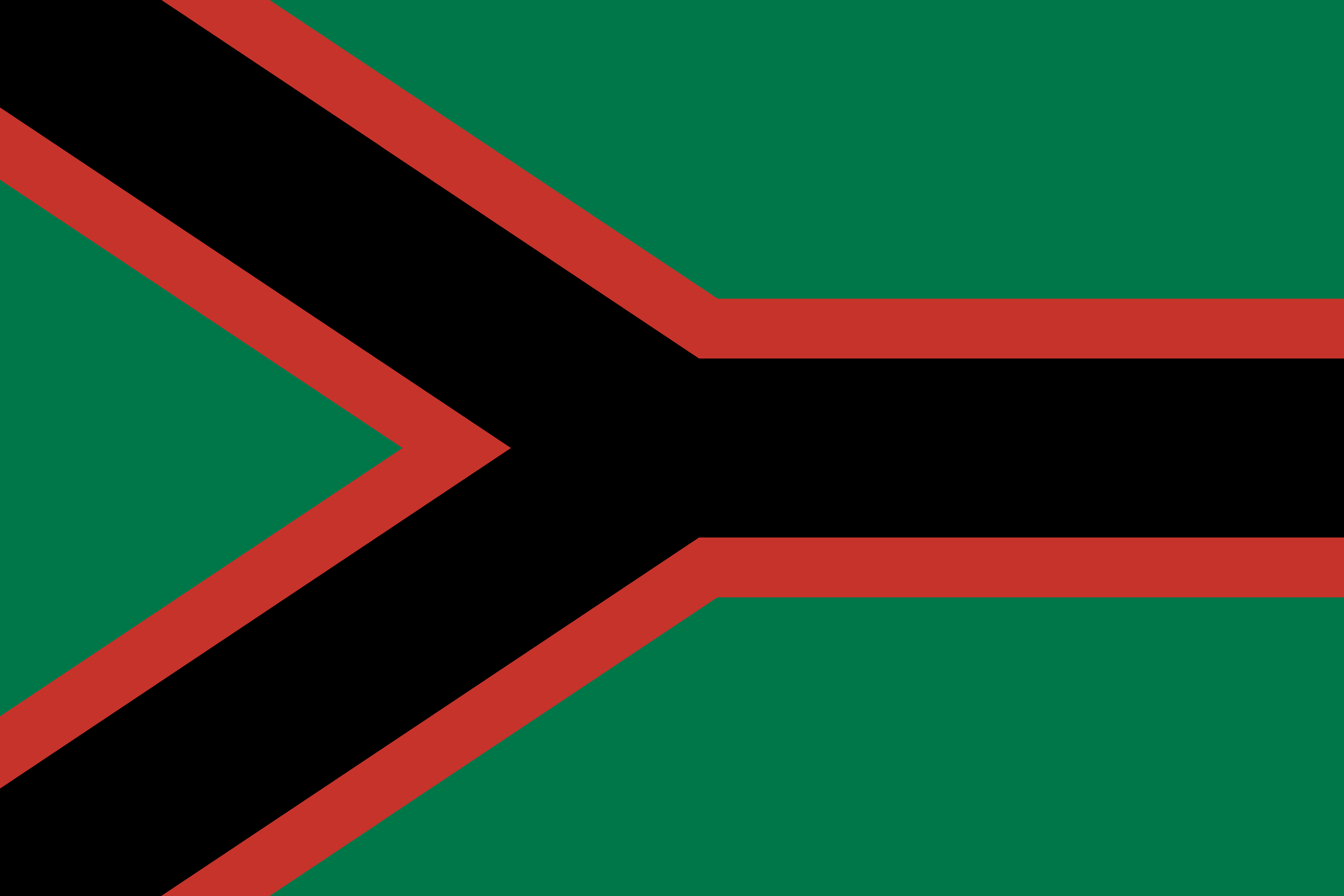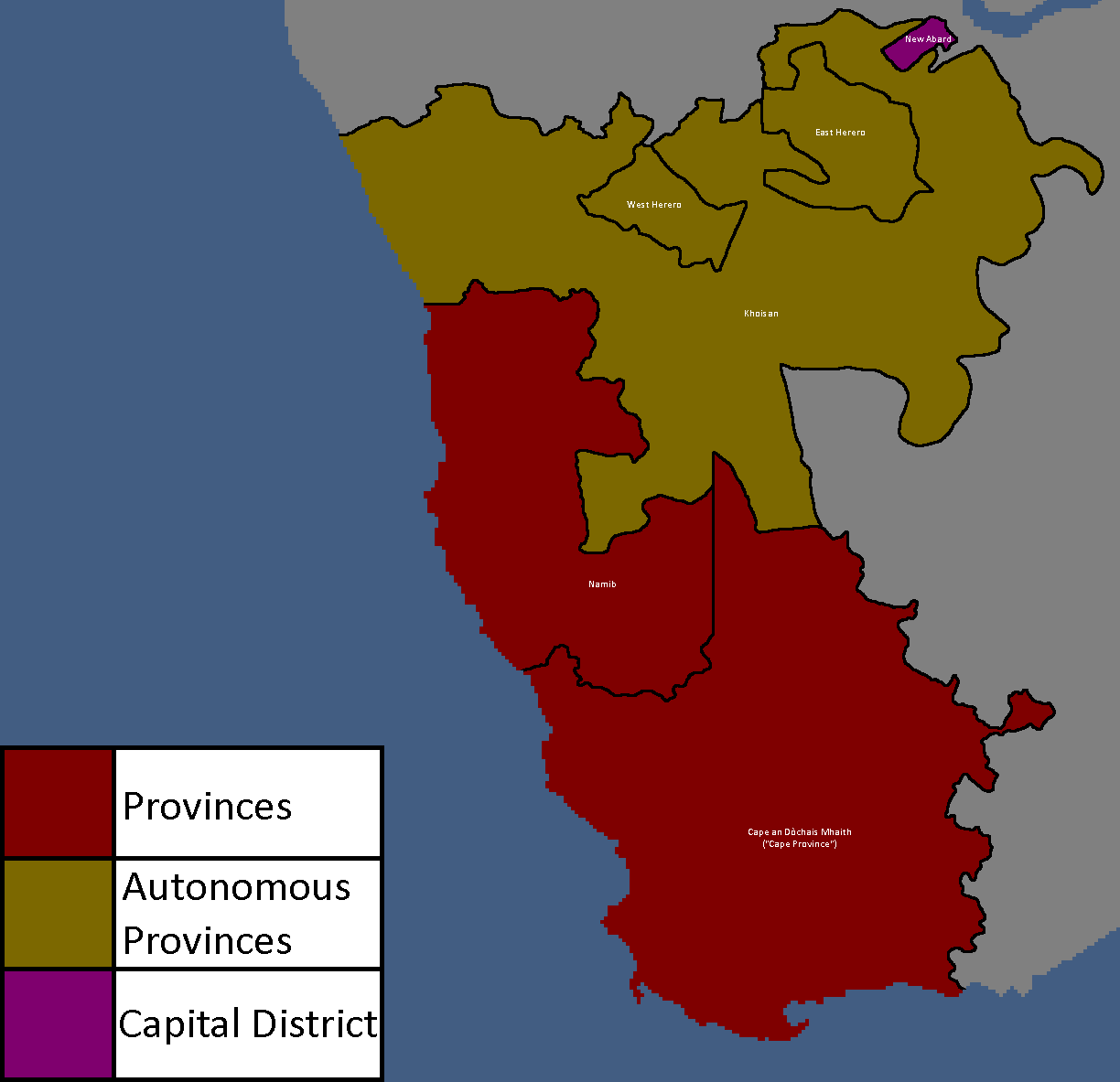Abard
| People's Republic of Abard | |
|---|---|
  | |
| General Info | |
| Official Name |
|
| Common Name | Abard |
| Motto | Unity in Diversity |
| Capital City | New Abard |
| Demonym | Abardean |
| Anthem | "Here seën Afrika / Beannaich an Tighearna Afraga" |
| Politics | |
| Government | Federal Presidential Republic |
| Ideology | Democratic Socialism |
| Head of State | Kaikara Loots |
| Head of Government | ⠀ |
| Legislature | Parliament of Abard |
| Ruling Party | Pan-African People's Party - Reformist |
| Official Language(s) |
|
| State Religion | Secular |
| Currency | Abardean Mark |
| Demographics | |
| Population | 13,717,778 |
| Species | Human |
| Ethnic Groups | |
| Major Languages |
|
| Minority Languages |
|
| Major Religions | Protestant Christianity |
| Major Cities | |
| Assets | |
| GDP | ⠀ |
| Soldier Count | 650 Thousand |
| Spacefleet | 31 Ships |
| Maritime fleet | 59 Active Ships |
| Airforces | 950 Aircraft |
| Nuclear Arsenal | 60 Warheads |
| Other Assets | ⠀ |
| Geography/Astrography | |
| Planet | Yata |
| Continent | Africa |
| Region | Southern Africa |
| Real-Life Location | South Africa & Namibia |
| Historical Info | |
| Founded |
|
| Dissolved |
|
| Preceded by | The Confederacy |
| Succeeded by | Yatan Commonwealth |
| Other | |
| Created by | Dognaps |
| Controlled by |
|
The People's Republic of Abard (Usually known as just Abard) was a Federal Presidential Republic located in the south-west of Africa, being the oldest nation within the continent. Abard bordered Wanaoishi to the north and the East African Federation to the east, with its capital of New Abard located near the tripoint between the three nations. Before its capital being located in far north of its territory, the southern city of Cape Town held the status of capital until it was abandoned following a plague outbreak.
Abard was one of the oldest continually existing countries on Yata, existing in with various different forms of government over its several centuries of existence. These eras included being an Absolute Monarchy, a Nationalist Republic, a Colony, a Fascist Constitutional Monarchy, and a socialist republic. The final governance in Abard was largely based upon the socialist constitution established in 355 following the EAF and PRA's victory in the Abardean War against the Abuja Accords, of which the far-right apartheid Empire of Abard was a member. Following this conflict, the Pan-African People's Party gained power in Abard and continued its reign until the Great War of Unity, following which Abard was annexed into The Confederacy until its declaration of independence 5 years later during the Confederacy's collapse. Following the regaining of independence, the reformist faction of the Pan-African People's Party gained power and greatly democratized and federalized Abard into its current system. Following this Abard became fairly peaceful, with its only major diplomatic participation being its membership in the Socialist Assembly and the Initiative for Peace and Democracy until it eventually joined the Yatan Commonwealth in 447.
Government & Politics
Abard was a Presidential Republic lead by president Kaikara Loots of the Pan-African People's Party's Reformist Faction. The President acted as both Head of State and Head of Government, with a independent legislature underneath them.
Additionally Abard was a Federal state, with each of its subdivisions having their own government and laws. The Autonomous Provinces of Khoisan, West Herero and East Herero hold significantly higher levels of autonomy than the standard Provinces of Cape and Namib located in the south. The Capital District was separate from any province, and was run as a federal district.
Economy
Economically Abard was a mixed economy in which the free market was still engaged with while the government implements socialist policies such as improved worker rights, nationalization of key industries, and state-managed wealth equality. While many of its major urban areas were dominated by the service sector, a majority of Abard's population still worked within the agricultural and industrial sectors, which tended to make up a majority of the nation's economy.
Demographics
Abard was very multicultural, with both native african ethnic groups such as the Khoisan and Herero peoples alongside groups descended from former colonists that have in the past controlled its territory.